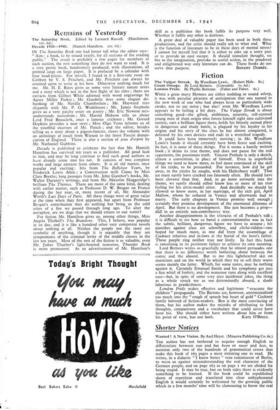Remains of Yesterday
OF The Saturday Book one had better tell what the editor says : " Aim : a book, to be issued yearly, for all sections of the reading public." The result is probably a few pages for members of each section, the rest something they do not want to read. It is a very pretty book, handsomely produced, with illustrations, all printed large on large paper. It is prefaced by a calendar with four head-pieces. For myself, I found in it a first-rate essay on Cobbett by V. S. Pritchett, and Mr. Pritchett can always be counted upon to write at his best. Otherwise nothing much for me. Mr. H. E. Bates gives us some very literary nature notes and a story which is not in the first flight of his tales ; there are extracts from Gilbert White adorned with wood engravings by Agnes Miller Parker ; Mr. Guedalla does some elegant de- bunking of Mr. Neville Chamberlain ; Mr. Hayward toys elegantly with Mr. P. G. Wodehouse ; Mr. James Stephens gives us a very patchy essay on poetry ; Mr. Eric Newton mis- understands surrealism ; Mr. Harold Hobson tells us about Lord Fred Beauclerk, once a famous cricketer ; Mr. Gerard Hopkins provides a neat story ; Miss Olgo Venn informs us of the youthful excesses of Mr. Punch ; and the editor, besides telling us a story about a pigeon-fancier, closes the volume with an anthology of insult from Warton to the latest Fascist denun- ciation of England. There is also a section of jeux d'esprit by Mr. Nathaniel Gubbins.
Decade is published to celebrate the fact that Mr. Hamish Hamilton has survived ten years as a publisher. All good luck to him, and may he long continue to find such good authors as have already come into his net. It consists of two complete works and large extracts from others. It is all old matter, once popular and exciting : bits from The Ballyhoo Years, by Frederick Lewis Allen ; a Conversation with Ciano by Miss Clare Boothe; long passages from Mr. John Gunther's books, Mr. Walter Dummy's writings, and from Mr. Malcolm Muggeridge's brilliant The Thirties. There are more of the same kind, dealing with earlier matter, such as Professor D. W. Brogan on France during the last year, or, more recent of all, Mr. Alexander Werth's Last Days of Paris. All these things were of great value at the time when they first appeared, but apart from Professor Brogan's contribution they do nothing but bring us the cold ashes of a fire we passed through long ago. To alter the metaphor, are we dogs that we should return to our vomit?
For fiction Mr. Hamilton gives us, among other things, Miss Angela Thirkell's The Brandon. This, I believe, was popular in its day, and it is like a hundred other very competent novels about nothing at all. Neither the people nor the story are symbolic of anything, though it is arguable that they are symptomatic of the criminal levity of the middle classes in the last ten years. Most of the rest of the fiction is as valuable, even Mr. James Thurber's light-hearted nonsense, Thunder Rock is more permanent. As an advertisement of Mr. Hamilton's
skill as a publisher the book fulfils its purpose very well. Whether it fulfils any other is dubious.
A great deal of valuable paper has been used in both these productions, and the critic should really ask to what end. What is the function of literature to be in these days of mental stress? I cannot for myself feel that it is either to rake up a sorry past or to provide an easy escape. It should stimulate thought, set fire to the imagination, provoke to useful action, in the pondered and enlightened way only literature can do. These books do not






















 Previous page
Previous page